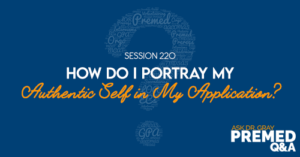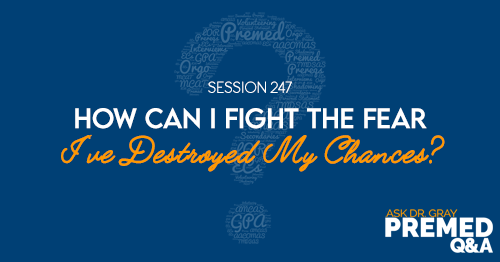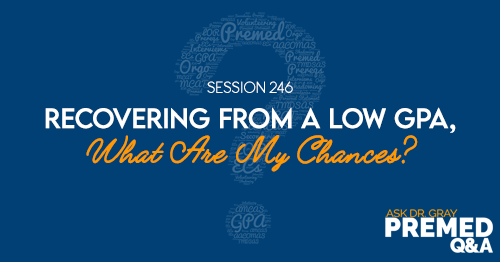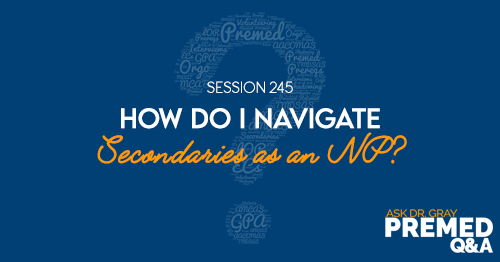Apple Podcasts | Google Podcasts
Session 220
This non-traditional student wants to know if their personal statement and activities show the whole picture of who she is as an applicant.
Ask Dr. Gray: Premed Q&A is brought to you by Blueprint MCAT. Listen to this podcast episode with the player above, or keep reading for the highlights and takeaway points.
The episodes in this podcast are recordings of our Facebook Live that we do at 3 pm Eastern on most weekdays. Check out our Facebook page and like the page to be notified. Also, listen to our other podcasts on MedEd Media. If you have any questions, call me at 617-410-6747.
[01:03] Question of the Day
“Every time I think I get to a good place with my personal statement, then I go back and look at my activities. I feel like there’s a little bit of a disconnect between what I’m trying to get across and what I’ve experienced, and maybe what a third party who doesn’t know me would be in that personal statement and those activities, particularly those references. So that’s kind of where I’m at. And this is, I think, especially pertinent given this new MCAT activities category that’s been added. I think it’s advocacy and social justice.
And so, for me, my background is nontraditional, in a sense. I have an undergraduate degree and an MPH both in public health, took a couple of years off, and joined the workforce. And then after a pretty difficult few personal years, I decided that I really wanted to go ahead and go through with what I always wanted, which is to pursue medical school.
Working in sort of the public health sphere, especially advocacy has been the salient theme through all of my experiences. Truthfully, a lot of my clinical exposure has been in my personal life. And so, again, it’s balancing the activities that I have with what I’m putting forth, in my personal statement, to really try and portray an accurate depiction of myself, my experiences, and how I got to where I am. And I know that personally, I feel my narrative makes sense to me and that’s getting that across.”
A: Students tend to talk about having a cohesive narrative and a lot of people will call that a theme. But your theme is you. At the end of the day, the application is who are you and why are you here?
“At the core of an application is projecting who you are.”Click To TweetThere’s not a lot of work that needs to be done to make this cohesive theme as long as you’re focused on telling your story. This is where a lot of students go wrong. If you watch any of my Application Renovation videos, they’re not telling their story. They’re telling the story that they think the med schools want to hear.
[03:49] Finding Motivation in Grief
In the student’s personal statement, she discussed the loss of her father and two close friends within a year. This experience exposed the student to the physician-patient relationship from the other side, as she witnessed her loved ones endure lengthy and mysterious illnesses unexpectedly.
Despite the heavy thematic content of grief, the student chose to use it as motivation rather than allow it to break them down. She made significant improvements in problematic behaviors and pursued a master’s degree while excelling in their career. The loss of her loved ones made the student question what truly makes her happy, which led her to consider pursuing medical school.
She says her interactions with the healthcare system made her realize that she needed to become a physician to fully understand illnesses and provide effective treatment. While their public health background and experience working with healthcare coverage and access are relevant to their interest in becoming a physician, she did not have prior experience with medical school.
If you find yourself in the same situation as this student, then there’s nothing you can do about that. Otherwise, do not apply and get more experiences that do support this narrative of wanting to be a doctor. If you go and look at my Application Renovation videos, almost all of them are in a similar situation. They want to be a doctor but they don’t really have the experience to show it.
[08:00] The Importance of Clinical Experience
Q: This student is wondering what activities she can engage in to demonstrate her commitment to becoming a physician. She worked internationally for several months with an NGO, shadowing physicians and assessing supply chain issues that prevent healthcare providers from delivering adequate care in rural areas.
Additionally, she worked at an official camp. While she has interacted with patients, she understands the significance of clinical exposure in demonstrating her interest in becoming a physician. However, she is unsure if her experience as a systems person in public health, interacting with patients, would be viewed as relevant clinical experience by medical schools. She plans to refer to the application revelation series to gain a better understanding of how to approach this question.
A: This all depends on what exactly you’re doing. A front desk person in a clinic is interacting with a patient but that’s admin. That’s not clinical experience. So it really just depends on exactly what you’re doing.
“The biggest mistake a student can make is not having clinical experience.”Click To TweetYour Main Job as a Physician
As you are entering a field, taking care of patients is your main job. Unfortunately, admin work takes up most of your time. But at the core of being a physician, is taking care of patients, for the majority of physicians out there.
As you’re seeing 20-30 patients a day, you’re going through their chief complaints, talking to your staff, and interacting with whoever you build relationships with over time. And so, you have to enjoy that part of the job. And that is part of the job that you start to get a feel for.
Whether you’re a medical assistant, a CNA, or an EMT, you are there at the bedside, interacting with these patients in some sort of clinical way.
What Isn’t Clinical Experience
But if you’re interacting with patients through a public health lens, and you talk about the social determinants of health, that’s not clinical experience. That’s exploring social determinants of health. That’s public health. That’s very, very important. But somebody looking at your application might only question why you’re not going to public health instead.
Taking care of patients is what clinical experience does. And if you’re missing that connection, and you’re worried that’s not going to come through, then it’s a completely valid concern. Of course, you can still apply, and they might take a chance on you. But you may get into a hospital setting, and you may not like it. And so, that is the biggest concern.
Hospice Experience
Now, this student goes on to say that she has hospice experience which is great. Hospice is one of the best experiences out there. It’s a little bit less of a traditional clinical experience, but I think it’s super valuable. It’s great for the patients that you’re supporting.
[15:22] Authenticity Over Perfection
Q: I am curious what sort of activities medical schools will be interpreting that, along with the rest of the package.
A: Medical schools interpret application categories differently, whether it’s advocacy and social justice, clinical experience, or volunteering. Each school has its own rubric and scoring system, and each reviewer has their own biases. There may be instances where a personal bias could hinder an applicant’s chances of getting into a particular school.
Therefore, it is not worth worrying about how medical schools will interpret the information provided in an application. What matters is telling one’s unique story, which includes their experiences, upbringing, family, friends, neighborhood, and schools attended.
This authenticity is what makes an application stand out, not just one specific activity. Instead of trying to stand out, focus on telling your story and let medical schools do their job. It is futile to waste time thinking about things one has no control over.
'You need to tell your story – your specific story – who are you that makes you you, that shows this life that you view your life through your lens.'Click To Tweet[18:13] The Goal of Your Personal Statement
Q: The student’s personal statement has heavy semantic content, and she is trying to ensure that it is not wordy. She aims to answer core questions while incorporating her unique experiences, such as those of her family members, into her story. However, she is running out of space to discuss all the meaningful experiences she wants to include.
The student is wondering if she should reference as many activities as possible or only the most meaningful ones. She is also unsure about how to approach referencing experiences she cannot fully discuss due to space constraints, such as working with hospice patients. Can she mention the experience briefly and provide more details later?
The job of a personal statement is – why medicine? It’s telling in 5,300 characters, or 5,000 for TMDSAS – Why do you want to be a doctor?
The Seed and the Watering Event
And as I’ve written in The Premed Playbook: Guide to the Medical School Personal Statement, I talk about your seed. What exposed you to health care that made you think about pursuing medicine?
Then you go on to talk about the watering events. What experiences have you had, interacting with patients typically, that have strengthened that desire?
A Reframed Version of The Scientific Method
The process of creating a personal statement is similar to the scientific method. It begins with a hypothesis, such as “I want to be a doctor or a PA.” To test this hypothesis, one must collect data by interacting with patients and analyzing their experiences. This process leads to conclusions, which are presented in the personal statement.
The personal statement should focus on activities that speak to the individual’s core motivations for becoming a physician within the 5300 character limit. However, there are some caveats to consider, such as excluding research from the personal statement since it is not directly connected to medicine.
[22:22] The Problem with Having a Theme
'Too many students try to force a theme. I don't think an application should have a theme, other than the theme is 'tell your story.'Click To TweetSome students may feel compelled to choose a theme, such as public health, for their personal statement. However, if an individual has been consistently involved in public health throughout their college career, it will naturally be a theme that emerges as they tell their story.
Therefore, there is no need to force a theme. Otherwise, it may only weaken the writing by attempting to fit everything into a predetermined narrative.
Ultimately, think about what you’ve done and just talk about the impact on you. You don’t have to tie everything to medicine. You don’t have to tie everything together. Just tell your story. Talk about each of these things that you’ve done. Talk about them individually impact-wise, and what they mean to you and all that fun stuff.
Links:
Medical School HQ Facebook page
Medical School HQ YouTube channel
Instagram @MedicalSchoolHQ
Join the Application Academy!
The Premed Playbook: Guide to the Medical School Personal Statement
The Premed Playbook: Guide to the Medical School Application Process
SEARCH SITE
LISTEN FOR FREE












